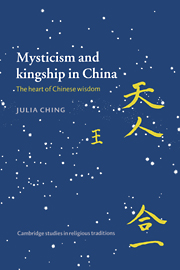Book contents
- Frontmatter
- Contents
- Preface
- 1 Son of Heaven: shamanic kingship
- 2 Son of Heaven: kingship as cosmic paradigm
- 3 The moral teacher as sage: philosophy appropriates the paradigm
- 4 The metaphysician as sage: philosophy again appropriates the paradigm
- 5 The paradigm enshrined: the authority of classics
- 6 The mystic as sage: religion appropriates the paradigm
- 7 The sage-king as messiah: religion again appropriates the paradigm
- 8 All under Heaven: political power and the periphery
- A glossary of Sino-Japanese names and terms
- Bibliography
- Index
4 - The metaphysician as sage: philosophy again appropriates the paradigm
Published online by Cambridge University Press: 15 December 2009
- Frontmatter
- Contents
- Preface
- 1 Son of Heaven: shamanic kingship
- 2 Son of Heaven: kingship as cosmic paradigm
- 3 The moral teacher as sage: philosophy appropriates the paradigm
- 4 The metaphysician as sage: philosophy again appropriates the paradigm
- 5 The paradigm enshrined: the authority of classics
- 6 The mystic as sage: religion appropriates the paradigm
- 7 The sage-king as messiah: religion again appropriates the paradigm
- 8 All under Heaven: political power and the periphery
- A glossary of Sino-Japanese names and terms
- Bibliography
- Index
Summary
INTRODUCTION
We are speaking of the appropriation of the sage-king paradigm by the philosophers. This appropriation became further strengthened with the evolution of the theory of Oneness of Heaven and humanity (T'ien-jen ho-yi). This theory is usually interpreted within a metaphysical framework. I am doing so while keeping in mind the political Mandate of Heaven, as I understand by the term ‘humanity’ primarily the paradigmatic human person, the sage, who should also be king. The reasons for that will become clearer after the discussion.
THE MYSTICAL CONSCIOUSNESS OF MENCIUS
‘Oneness between Heaven and Humanity’ usually refers to the correspondence and harmony between two realms: the human, and the natural or cosmic. We search in vain in the Analects and in the classics for an explicit articulation of these four Chinese words. However, the meaning is implicit as a philosophical presupposition for several of these texts, in particular the Appendix to the Book of Changes – actually a commentary added in the early Han dynasty. And we find in Mencius a philosophical development that we may well associate with these words. We do so if we remember that with Mencius, the t'ien fieri or Heaven has come to represent much more of a transcendent moral force, rather than the supreme personal deity that it appeared to have been with Confucius, ‘For a man to give full realisation to his mind or heart is for him to understand his own nature, and a man who knows his own nature will know Heaven. By retaining his mind or heart and nurturing his nature he is serving Heaven’ (Mencius 7A:I).
- Type
- Chapter
- Information
- Mysticism and Kingship in ChinaThe Heart of Chinese Wisdom, pp. 99 - 131Publisher: Cambridge University PressPrint publication year: 1997
- 1
- Cited by



